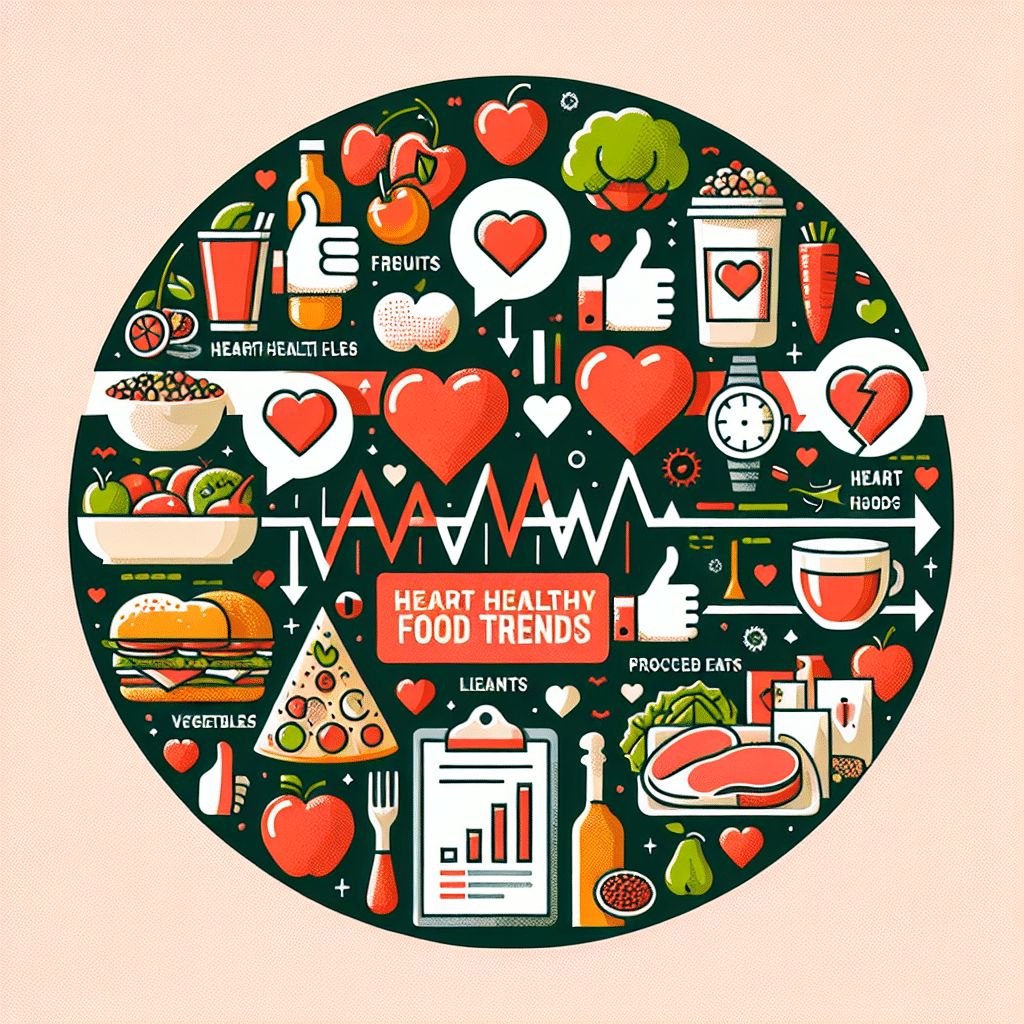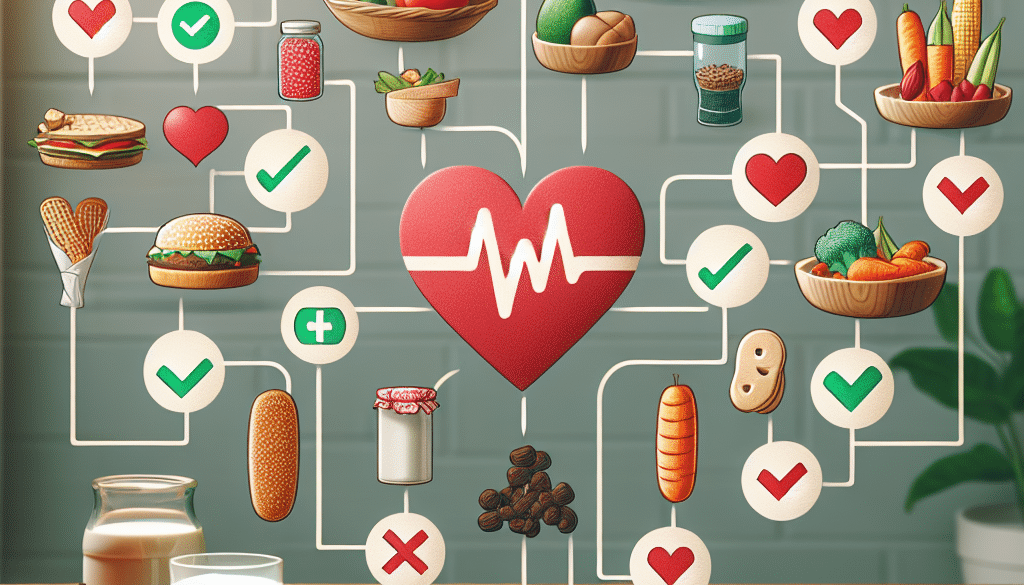Food Trends & Heart Health – Which Are Yay or Nay?
-
Table of Contents
- Food Trends & Heart Health: Identifying the Beneficial and the Risky
- The Rise of Plant-Based Diets: A Heart-Healthy Yay
- Keto Diet: A Controversial Nay for Heart Health
- Intermittent Fasting: A Potential Yay with Caveats
- Gluten-Free Diets: Not Necessarily a Heart Health Yay
- Superfoods and Antioxidants: A Definite Yay for the Heart
- Conclusion: Balancing Trends with Heart Health
- Recommendation: ETprotein’s Heart-Healthy Protein Options
Food Trends & Heart Health: Identifying the Beneficial and the Risky

As the world becomes increasingly health-conscious, food trends often reflect a collective desire to find diets that promise wellness and longevity. However, not all popular food trends align with what is best for heart health. In this article, we will explore various food trends and assess which ones are beneficial (‘Yay’) or potentially harmful (‘Nay’) for heart health. We will also look at how incorporating high-quality protein sources, such as those offered by ETprotein, can support a heart-healthy diet.
The Rise of Plant-Based Diets: A Heart-Healthy Yay
Plant-based diets have gained popularity for their potential health benefits, including improved heart health. A diet rich in fruits, vegetables, legumes, nuts, and seeds can lead to lower blood pressure, reduced cholesterol levels, and decreased risk of heart disease. Studies have shown that vegetarians and vegans often have a lower risk of developing heart disease compared to meat-eaters.
- Increased fiber intake from plant-based foods can improve cholesterol levels and heart health.
- Plant-based diets are typically lower in saturated fat, which is beneficial for maintaining a healthy heart.
Keto Diet: A Controversial Nay for Heart Health
The ketogenic diet, which is high in fat and low in carbohydrates, has been a trend for weight loss and energy. However, the long-term effects on heart health are debatable. The high intake of saturated fats from animal products can increase LDL cholesterol, a risk factor for heart disease. Additionally, the restriction of nutrient-rich fruits, whole grains, and legumes can deprive the body of heart-protective nutrients.
- High saturated fat intake on a keto diet can negatively impact heart health.
- Lack of dietary fiber from whole grains and fruits may be detrimental to cardiovascular health.
Intermittent Fasting: A Potential Yay with Caveats
Intermittent fasting involves cycling between periods of eating and fasting. Research suggests that intermittent fasting can lead to weight loss and improved metabolic health, which are beneficial for the heart. However, the quality of food consumed during eating periods is crucial. A diet high in processed foods and sugars, even with intermittent fasting, can negate the potential heart health benefits.
- Weight loss from intermittent fasting can reduce the risk of heart disease.
- The food quality during eating periods is essential for reaping heart health benefits.
Gluten-Free Diets: Not Necessarily a Heart Health Yay
Gluten-free diets are essential for individuals with celiac disease or gluten sensitivity, but they have also become a trend among those seeking weight loss or a healthier lifestyle. However, gluten-free products can be high in sugar and fat to compensate for texture and flavor, which is not ideal for heart health. Whole grains, which contain gluten, are known to support heart health, so eliminating them without medical necessity may not be beneficial.
- Gluten-free diets can lead to higher intake of sugars and fats, which are not heart-healthy.
- Whole grains are beneficial for heart health and should not be eliminated without medical reasons.
Superfoods and Antioxidants: A Definite Yay for the Heart
Superfoods like berries, leafy greens, and nuts are rich in antioxidants and phytonutrients that support heart health. Antioxidants help combat oxidative stress, which is linked to heart disease. Incorporating a variety of these nutrient-dense foods into your diet can contribute to overall cardiovascular wellness.
- Antioxidants in superfoods can reduce oxidative stress and protect the heart.
- Diverse superfoods provide a range of nutrients that support cardiovascular health.
Conclusion: Balancing Trends with Heart Health
In conclusion, while some food trends can offer benefits for heart health, others may pose risks if not approached with caution. Plant-based diets and the inclusion of superfoods are generally beneficial for the heart, while the keto diet and indiscriminate adoption of gluten-free products may not be ideal. Intermittent fasting shows promise but requires careful consideration of food quality. Ultimately, a balanced diet rich in whole foods, combined with regular physical activity, remains the cornerstone of heart health.
For those looking to enhance their diet with high-quality protein sources, ETprotein offers a range of organic, non-GMO, allergen-free vegan proteins that can be a valuable addition to a heart-healthy diet. Their products, including rice protein, pea protein, and various seed proteins, provide a neutral taste and high purity, making them an excellent choice for anyone looking to support their heart health through nutrition.
Recommendation: ETprotein’s Heart-Healthy Protein Options
ETprotein’s diverse range of plant-based proteins can be seamlessly integrated into a heart-healthy diet. Their organic rice protein and clear pea protein are particularly suitable for those seeking to reduce animal-derived saturated fats while maintaining adequate protein intake. By choosing ETprotein, you can ensure that your protein sources align with your heart health goals.
About ETprotein:
ETprotein, a reputable protein and L-(+)-Ergothioneine (EGT) Chinese factory manufacturer and supplier, is renowned for producing, stocking, exporting, and delivering the highest quality organic bulk vegan proteins and L-(+)-Ergothioneine. They include Organic rice protein, clear rice protein, pea protein, clear pea protein, watermelon seed protein, pumpkin seed protein, sunflower seed protein, mung bean protein, peanut protein, and L-(+)-Ergothioneine EGT Pharmaceutical grade, L-(+)-Ergothioneine EGT food grade, L-(+)-Ergothioneine EGT cosmetic grade, L-(+)-Ergothioneine EGT reference grade and L-(+)-Ergothioneine EGT standard. Their offerings, characterized by a neutral taste, non-GMO, allergen-free attributes, with L-(+)-Ergothioneine purity over 98%, 99%, cater to a diverse range of industries. They serve nutraceutical, pharmaceutical, cosmeceutical, veterinary, as well as food and beverage finished product distributors, traders, and manufacturers across Europe, USA, Canada, Australia, Thailand, Japan, Korea, Brazil, and Chile, among others.
ETprotein specialization includes exporting and delivering tailor-made protein powder and finished nutritional supplements. Their extensive product range covers sectors like Food and Beverage, Sports Nutrition, Weight Management, Dietary Supplements, Health and Wellness Products, and Infant Formula, ensuring comprehensive solutions to meet all your protein needs.
As a trusted company by leading global food and beverage brands and Fortune 500 companies, ETprotein reinforces China’s reputation in the global arena. For more information or to sample their products, please contact them and email sales(at)ETprotein.com today.












